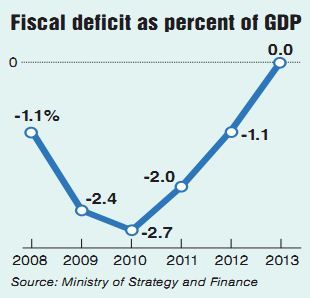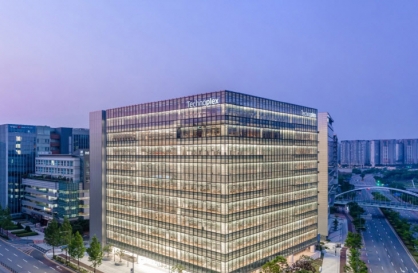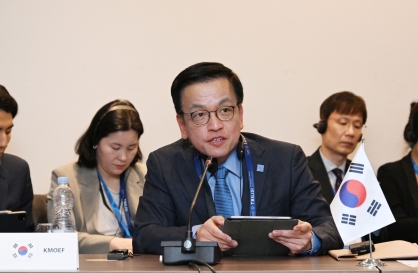The government will seek a balanced budget next year despite an expected outpouring of welfare legislation from the parliament.
A government roadmap on budget compilation and fund use for next year, approved by the Cabinet on April 24, calls for refraining from indiscriminate welfare programs and giving state aid to welfare programs selectively. If it achieves this fiscal goal, it will be the second time since 1980 for the government to equal revenue to expenditure. The government budget has been balanced once since 1980 ― in 2003, the first year of the Roh Moo-hyun administration. The 2003 budget was completed during the previous Kim Dae-jung government.

Under the balanced budget guidelines, the government will pursue sustainable growth through expansion of jobs, education, research and development, new industries and shared development of large, small and mid-size companies.
Overall, the roadmap commits the incoming government under the next president to refrain from splurging in its first year. It will make welfare conditional upon work.
Thus, politicians’ pledges to expand old-age pension and increase livelihood aid to the very poor have a low chance of being reflected in the government budget proposal.
The guideline also restricts construction of new roads or railways and regional festivals. Next year’s budget to be proposed by the government will be tipped toward “sustainable” growth rather than welfare. It means a rough setting to be laid out for the next government, which may feel tempted to show some short-term achievements in its first year.
As a finance ministry official put it, the balanced budget guideline signals the start of a long and tough battle with the parliament. The initial session of the next National Assembly and presidential candidates will likely push or present ambitious, costly projects to woo voters. General election pledges by the ruling Saenuri and the main opposition Democratic United parties are estimated to require 18 trillion won (about $16 billion) and 32 trillion won, respectively, next year, which amount to about 10 percent of the total budget expenditure. The government also faces a fierce budget battle with politicians over tax system revision.
The finance ministry has a few cards to be used to persuade lawmakers during the budget session. One of them is the renewed importance of fiscal soundness. In the wake of the budget crisis in Europe, credit ratings agencies prioritized fiscal soundness as a sovereign ratings criterion. Another card available to check larger regional projects is a tightened fiscal procedure. A project costing over 50 billion won a year and going over 200 billion won in total expenditure is required to go through a review by the fiscal risk management panel. From next year, the assessment of long-term effects will also become mandatory for national pension, insurance and education projects.
By Chun Sung-woo (swchun@heraldcorp.com)
A government roadmap on budget compilation and fund use for next year, approved by the Cabinet on April 24, calls for refraining from indiscriminate welfare programs and giving state aid to welfare programs selectively. If it achieves this fiscal goal, it will be the second time since 1980 for the government to equal revenue to expenditure. The government budget has been balanced once since 1980 ― in 2003, the first year of the Roh Moo-hyun administration. The 2003 budget was completed during the previous Kim Dae-jung government.

Under the balanced budget guidelines, the government will pursue sustainable growth through expansion of jobs, education, research and development, new industries and shared development of large, small and mid-size companies.
Overall, the roadmap commits the incoming government under the next president to refrain from splurging in its first year. It will make welfare conditional upon work.
Thus, politicians’ pledges to expand old-age pension and increase livelihood aid to the very poor have a low chance of being reflected in the government budget proposal.
The guideline also restricts construction of new roads or railways and regional festivals. Next year’s budget to be proposed by the government will be tipped toward “sustainable” growth rather than welfare. It means a rough setting to be laid out for the next government, which may feel tempted to show some short-term achievements in its first year.
As a finance ministry official put it, the balanced budget guideline signals the start of a long and tough battle with the parliament. The initial session of the next National Assembly and presidential candidates will likely push or present ambitious, costly projects to woo voters. General election pledges by the ruling Saenuri and the main opposition Democratic United parties are estimated to require 18 trillion won (about $16 billion) and 32 trillion won, respectively, next year, which amount to about 10 percent of the total budget expenditure. The government also faces a fierce budget battle with politicians over tax system revision.
The finance ministry has a few cards to be used to persuade lawmakers during the budget session. One of them is the renewed importance of fiscal soundness. In the wake of the budget crisis in Europe, credit ratings agencies prioritized fiscal soundness as a sovereign ratings criterion. Another card available to check larger regional projects is a tightened fiscal procedure. A project costing over 50 billion won a year and going over 200 billion won in total expenditure is required to go through a review by the fiscal risk management panel. From next year, the assessment of long-term effects will also become mandatory for national pension, insurance and education projects.
By Chun Sung-woo (swchun@heraldcorp.com)
-
Articles by Korea Herald





![[Weekender] Korean psyche untangled: Musok](http://res.heraldm.com/phpwas/restmb_idxmake.php?idx=644&simg=/content/image/2024/05/02/20240502050841_0.jpg&u=)

![[Eye Interview] 'If you live to 100, you might as well be happy,' says 88-year-old bestselling essayist](http://res.heraldm.com/phpwas/restmb_idxmake.php?idx=644&simg=/content/image/2024/05/03/20240503050674_0.jpg&u=)










![[Herald Interview] Director of 'Goodbye Earth' aimed to ask how we would face apocalypse](http://res.heraldm.com/phpwas/restmb_idxmake.php?idx=652&simg=/content/image/2024/05/03/20240503050732_0.jpg&u=)
